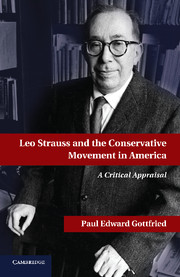3 - Constructing a Methodology
Published online by Cambridge University Press: 05 January 2012
Summary
Relevant and Irrelevant Criticisms
A major legacy of Leo Strauss’s life and scholarship was a distinctive way of reading texts. Despite Strauss’s attempt to assure Hans-Georg Gadamer in 1954 that his “hermeneutic experience is very limited and excludes the possibility of a universal hermeneutic theory,” his assertion is not to be taken uncritically. Strauss pioneered a way of studying political classics that his students took over and disseminated. Once created, this method was carried from Strauss’s redoubt at Chicago into departments of political science and political theory across the United States and Canada.
One can identify Strauss’s hermeneutic by how its adherents examine texts and by the political thinkers they interpret. Plato, Averroes, Maimonides, Machiavelli, Hobbes, Spinoza, Locke, Montesquieu, Rousseau, and Tocqueville – and less often Aristotle, Burke, and Hegel – are thinkers whom Strauss and his disciples have considered worthy of scrutiny. By contrast, they care less (except for the Catholic Straussians) about any distinctly Christian political heritage. This disinclination may come from the belief that the best political thinkers are thought to have been religious skeptics. Some Straussians have also claimed to find concealed skepticism about religious or political authority in medieval writers who are conventionally considered orthodox Catholics.
- Type
- Chapter
- Information
- Leo Strauss and the Conservative Movement in America , pp. 38 - 67Publisher: Cambridge University PressPrint publication year: 2011



